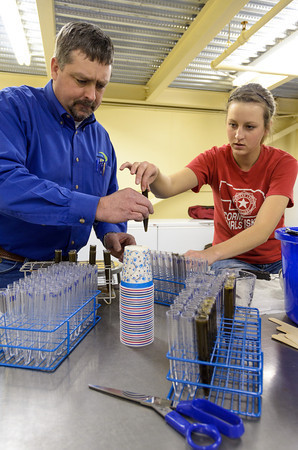Pre-vet students experience high-impact learning

Two Chadron State College pre-veterinary science students, Kara Sutphen, a sophomore, and Mara Seifer, a junior, took the initiative to research a common problem for beef producers in the region - internal parasites.
Sutphen’s and Seifer’s backgrounds growing up on area ranches, taking pre-vet classes together at CSC and pursuit of professional career goals motivated them to undertake a major research project in cooperation with Merck Animal Health.
The students contacted 16 beef producers in the Nebraska Panhandle and southwest South Dakota and made arrangements with Merck Rep and CSC alum John Denton from Bayard, Neb. to conduct testing for the presence of internal parasites. The presence of the internal parasites can compromise the immune system of the animal, decrease its appetite, or both.
The timing was right for Dr. Don Bliss, veterinary parasitologist and owner of Mid-America Ag Research, to be in Chadron for the sample analysis since he had prior commitments in Casper and Torrington, Wyo.
For four days prior to Bliss’s arrival in Chadron, Sutphen and Seifer collected golfball size sized fecal samples recently eliminated from 235 animals. Older animals tend to build up a level of immunity to parasites so samples were collected from animals from one to five years in age.
Bliss, from Verona, Wis., brought his own specialized microscope which connects to a laptop allowing producers to see the parasites at a greatly magnified size. The testing was conducted at no cost to the producers.
A 90-minute program, question and answer session and dinner for the producers, sponsored by Merck, took place at the Dawes County fairgrounds. Sutphen, Denton and Bliss shared the results of the tests with the 25 producers in attendance and discussed strategic treatment regimens. Seifer was out of town with a family business commitment.
CSC professor Dr. Joyce Hardy said, “Having Dr. Bliss on our campus evaluating local herds, teaching methodology and interacting with Chadron State pre-vet students was a great opportunity to get 'real-world' experience. Kara Sutphen and Mara Seifer were instrumental in making this a reality. Their initiative, dedication, and hard work made this a reality. They will become outstanding veterinarians.”
The students plan to submit a report about their research work to several livestock production publications.
Seifer said, “We are grateful to the producers for their support of our research project.” As an extra touch, the students sent thank you notes to all the producers who made their herds available for testing.
Sutphen added, “The project was well-received. I would do it again. John Denton’s patience helped since we had a lot of questions as we prepared the lab.”
Dr. Georgia Younglove, CSC professor, said, “It is truly inspiring to see these two young ladies go above and beyond in their education and community service. The credit for providing the opportunity for a renowned parasitologist to provide information for local producers and ‘hands-on’ experiences for our own students really goes to Kara and Mara and their collaboration with Merck.”
Last year, Denton, a 1991 CSC ag-business alum, sampled Sutphen’s father’s herd and in a subsequent conversation with her discovered that she was interested in conducting a parasite evaluation clinic. Denton said, “It was a great opportunity to expose students to the Wisconsin sugar floatation method which Dr. Bliss uses."
Category: Campus News, Physical and Life Sciences, Range Management
